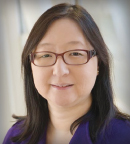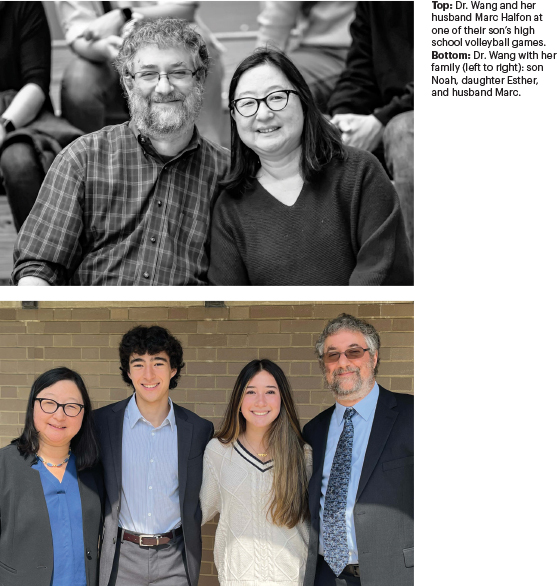Leukemia expert Eunice S. Wang, MD, is the daughter of first-generation immigrants, whose work ethos inspired in her a world without boundaries. “My parents were born in China during the communist era, and they immigrated to Taiwan when the communists took over in the 1940s and then subsequently came to the United States after college to pursue advanced degrees. They met in Massachusetts; I was born at the Brigham and Women’s Hospital in Boston and grew up on the outskirts of Boston. I remember when I first went to elementary school, I did not speak English very well because I was primarily raised in a Chinese-speaking home. I had to go through some language lessons to learn how to speak English fluently. We were one of the very few Asian-American families in the area growing up,” explained Dr. Wang.
EUNICE S. WANG, MD

TITLE
Associate Professor of Medicine, Department of Medicine, Roswell Park Cancer Center, Jacobs School of Medicine and Biomedical Sciences, Buffalo, New York
MEDICAL DEGREE
Keck School of Medicine of the University of Southern California, Los Angeles
ON CHANGE IN CAREER GOALS
“When I started in the lab, I had a PhD in mind and lab research as my goal. But working with Mike [Caligiuri] and Jerry [Ritz], I saw with an MD, I could have the best of two worlds: translational research and patient care in the clinic. That’s how I decided to become a clinician/scientist.”
Dr. Wang is the Chief of the Leukemia Service at Roswell Park Comprehensive Cancer Center in Buffalo, New York. Asked how her parents’ story of immigrating to the United States affected her perspective on life, Dr. Wang replied: “As for many immigrant parents, this is a familiar story; come to the United States to get ahead through education and hard work. And I think my parents at some point had experienced some discrimination, and they always said not to make a big deal of it but just to continue working to succeed. They were going to support whatever I needed to do. So, if I had to take an hour and a half to get to work and an hour and a half to get back, that was the way it was. Although I wanted to go to a public school, my parents sent me to a private school [Concord Academy]. They said, ‘You have to go because this is where you’re going to get the best opportunities.’ That thinking instilled in me a work ethic and belief system that regardless of what happens, success will eventually come if you work hard, regardless of the other disadvantages you might have.”
Love of Science
According to Dr. Wang, it was an opportunity to work in a lab that cemented her nascent love of science. “When I went to high school, I developed an interest in science. I really loved the advanced placement biology course. I was actually interested in art, and my advisor was the art teacher. However, her husband was a neurobiologist, and he worked in a laboratory outside Boston,” she related.
Dr. Wang continued: “For one of my summers in high school, my advisor set me up to work with her husband in a laboratory. I had this very interesting project where he was studying the neural networks in the brain of a rattlesnake. My job was to take all of these slices of the rattlesnake brain and trace the neuron networks and draw them out in these slides; it was a very interesting project. And it kind of combined my interest in art with this growing interest in research.”
During the subsequent summer, she worked in a different laboratory in the building. “They looked at DNA, and I worked with bacteria and did DNA cloning,” Dr. Wang explained. “I would get up, and my dad would drive me to the bus station; I would take the bus into Boston, take a subway into the city, work in the lab, and then commute all the way back. I decided that although I loved art, I wanted to go into science, and it was really intriguing. My goal was to become a scientist.”
Educational Journey
After graduating high school, Dr. Wang had her sights set on a college that put distance between her and her hometown of Boston; however, her parents, “who were very traditional,” wanted her to apply to all the local Ivy League schools. To please them, she did, and to her “astonishment” she was accepted to Harvard University.
Dr. Wang commented: “I knew my parents were going to be so proud of me, and I remember taking the admission letter and wrapping it up and putting it under their Christmas tree. They got a wonderful Christmas present. I was able to attend on scholarships and financial aid. It was a great experience in that I was able to move forward with my education and still have the ability to go home on the weekends and see my parents. That provided a lot of support to me when I was an undergrad. I did spend the summers away, living on campus, but it was a great opportunity for me to further my education and retain my ties to my family. Harvard was a terrific experience.”
Inspiration Behind Interest in Leukemia Research
Given her love of basic science, Dr. Wang intended to get her PhD and pursue a career in the lab. However, during her freshman year at Harvard, one of her classmates developed acute leukemia and left school to be treated at Dana-Farber. Inspired by her classmate’s leukemia diagnosis, Dr. Wang took the subway to Dana-Farber and explained her desire to work in a lab doing leukemia research, landing her an opportunity to work in the lab of the hematologist Dr. Jerry Ritz.
“I ended up working as an undergraduate in Jerry’s lab with his fellow, Dr. Michael Caligiuri, for the next 2 years, looking at the role of interleukin-2 and natural killer cell biology,” Dr. Wang continued. “I remember being inspired by the fact that we’d work in the lab and then Michael would say, ‘Okay, I got to run to the clinic,’ and he’d put on his white coat and run off to clinic,” she said. “When I started in the lab, I had a PhD in mind and lab research as my goal. But working with Mike and Jerry, I saw with an MD, I could have the best of two worlds: translational research and patient care in the clinic. That’s how I decided to become a clinician/scientist.”
From Boston to Taipei to Singapore to Los Angeles
After attaining her undergraduate degree from Harvard University, Dr. Wang took a year off to live with relatives in Taiwan, where she landed a tech job in a research lab. She described this institution as the Taiwanese equivalent of the National Institutes of Health. While there, she also prepared for medical school.
“I took my MCATs in Singapore because it was the only place in East Asia that offered the test,” Dr. Wang noted. “So, I ended up leaving work on Friday, flying from Taipei to Singapore on Saturday, taking the MCATs, and flying back. I went to medical school at the Keck School of Medicine of the University of Southern California in Los Angeles largely because I wanted to experience academic and social life on the west coast outside of New England.”
Returning to New England
After earning her medical degree from the Keck School of Medicine, University of Southern California (USC), Dr. Wang had grown tired of the cross-country flights back home to visit her parents and relocated back to the East Coast. She entered a residency program in internal medicine at Yale–New Haven Hospital in Connecticut in 1999. During her residency, Dr. Wang took advantage of Yale’s International Health Program, doing rotations in poorer areas of South Africa and China. “Working with those poor people in a city hospital in China and in a clinic in a shantytown in South Africa were valuable experiences that complemented all the academic things I was doing as well,” she noted.

Asked about noted mentors, Dr. Wang replied: “I really admired Alexandra Levine, an HIV hematologist at USC. Howard Liebman and Ann Mohrbacher were also inspirational physicians in my early years at USC. When I went to Yale, one of my primary mentors was Nancy Berliner. I remember going on rounds with her. She was a great example to me of a strong woman who could do research as well as being a great clinician and a leader. Joel Rappaport, Head of the Transplant Service, encouraged me to go to Memorial Sloan Kettering, where I was mentored by David Golde, Joe Jurcic, Peter Maslak in the clinic and Malcolm Moore in the laboratory. I was fortunate to have so many valuable mentors. In addition, I got involved with ASCO as a fellow, and it was a great experience. My receipt of an ASCO–Young Investigator Award (YIA) during my last year of fellowship validated that the translational and clinical research I was doing was valuable and that there might be a career in academia for me.”
Current Work
Asked to share a glimpse at what her work week might look like, Dr. Wang shared these thoughts: “I juggle a number of different roles. I am Chief of the Clinical Leukemia Service, which treats all patients with acute leukemias and myeloid malignancies as well as bone marrow failure and benign hematology. I think it’s incredibly valuable for me to mentor my junior faculty. I also direct a translational laboratory and a tissue procurement bank. I lead our leukemia clinical trial portfolio and am very proud to have an active early-phase trial program offering novel agents. We’re the only comprehensive cancer center in western, upstate New York, stretching all the way up to Canada and all the way out west to Cleveland and down to Pittsburgh. We have a large cachement area, and our patients are generally not socioeconomically wealthy. I serve as Medical Director of our chemotherapy/infusion center, which serves almost 200 patients a day. So, I keep very busy. I’m most proud that we deliver high-quality cancer care to a wide and diverse patient population.”
Advice for Upcoming Oncologists
Dr. Wang was asked to share words of wisdom for young medical students who might be pondering a career in the challenging field of oncology. Here are her thoughts: “Oncology is more like a calling than a career. One could argue there are careers where you’re potentially going to be making more money or going to have maybe a better work/life balance and not have to deal with end-of-life crises. For example, I had to tell a 21-year-old patient the other day that we have no treatment options, and he has to go home. However, there are very few careers where you’re at such an important arc in a person’s life. I believe we’re privileged to have the opportunity to do what we do and also to participate in all of these amazing scientific advances that are prolonging lives. For me, there’s no better career in the medical profession.”
Decompression Time
How does a super-busy oncology leader wind down? “I have the privilege of being able to travel as part of my work,” Dr. Wang said. “I am married and have two teenagers, aged 15 and 17. I currently decompress by driving them to their sporting events, cheering them on, and helping them with college applications. Until my kids finish high school, they’re my primary ‘hobby.’ And, of course, I am an avid Buffalo Bills fan!”

